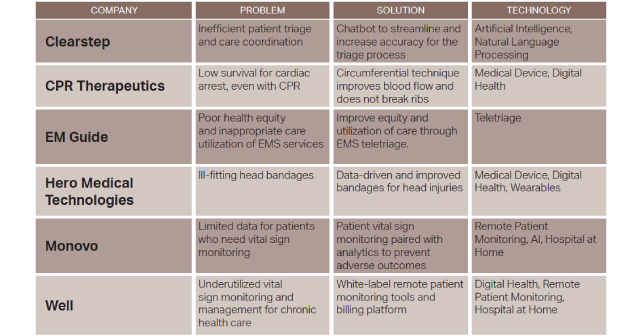
The second annual Stanford Emergency Medicine Innovation Symposium (STEMI X) was held in May 2022. Almost 400 emergency physicians and other health care stakeholders gathered virtually for keynote talks and roundtable discussions focused on how emerging technology could improve emergency care. Topics included digital health, artificial intelligence/machine-learning (AI/ML) algorithms, medical devices, and precision-based care for patients.
Explore This Issue
ACEP Now: Vol 41 – No 10 – October 2022STEMI X also featured “Pitch ‘EM,” a pioneering pitch competition. Like ‘Shark Tank’, health care entrepreneurs had 10 minutes to pitch their idea to improve care in the emergency department. The winning team received $5,000 and mentoring with Stanford’s Emergency Medicine Partnership Program.
Nearly 30 companies competed to be one of the six finalists who pitched their innovation to the live STEMI X audience. The six finalists presented innovations featuring medical devices, AI, teletriage, and remote patient monitoring. The contest was judged by six venture capitalists representing firms that invest in health care innovation; five of these judges were physicians.
The Finalists
CPR Therapeutics
Dr. Norman A. Paradis, MD, is an emergency physician, CEO, and founder of CPR Therapeutics (CPR-T), creators of an innovative compression-providing vest for cardiopulmonary resuscitation (CPR), the mainstay treatment for out of hospital cardiac arrests. Their CPR-T solution allows providers to save a patient’s life with high quality compressions delivered via a circumferential patient vest. This smart device avoids rib trauma and is able to provide electrical defibrillation. Dr. Paradis’s group is developing their CPR-T Radiolucent Cath Lab Vest which will allow patients to obtain active compressions and life-saving resuscitative measures while undergoing critical re-vascularization procedures in the cardiac catheterization lab.
Hero Medical Technologies
Hero Medical Technologies seeks to improve and streamline patient care for individuals with head injuries from early injury through hospitalization. They offer a unique bandage, which doubles as a wound dressing and monitoring system. Hero Medical seeks to eliminate potential gaps in vital sign monitoring as well as hemorrhage control for the 1.4 million patients with traumatic head injuries seen in the hospital yearly, who account for $25.2B in hospital admissions and $76.5B in overall healthcare related costs for the head injury market nationwide. They’ve received funding from Johnson & Johnson Innovation Labs and an FDA grant. They’ve piloted their device with both the Baylor College of Medicine and the Perelman School of Medicine at the University of Pennsylvania.
Well
Alex Prokhorov co-founded Well, a startup focused on remote patient monitoring (RPM) paired with white-label devices and an electronic health record, creating a seamless Hospital at Home model with trackable health care data and reportable billing. With over 300 integrated devices, the Well platform accommodates multiple avenues for RPM via smartscales, smartwatches, blood pressure cuffs, glucometers, and oximeters. Their patient-centered dashboard offers alerts, tracks trends, and allows patients to share their health data with their physician, ensuring that their physician is aware of both changes in their health and when the patient needs follow-up visits. Well’s physician suite includes convenient tools to manage billing codes, patient evaluation reminders, and data exportation.
Pages: 1 2 3 | Single Page





One Response to “STEMI X Symposium Holds Health Care Innovation Ideas Competition”
October 31, 2022
Bob SweeneyAs often, emergency medicine is a source of innovation in medical technology, diagnosis and treatment. Global Health Impact Fund salutes this tradition of innovation.